William Hemsworth's Blog, page 93
November 14, 2020
Deuterocanon: Defending It Is Essential
Earlier this week I was honored to speak with Catholic speaker and apologist Gary Michuta about the Deuterocanon. He is the host of Hands on Apologetics which airs daily at 1:00pm EST on Virgin Most Powerful Radio.
Discussing The Deuterocanon
He is also the author of several books including “Why Catholic Bibles Are Bigger” and “The Case For The Deuterocanon“. He also has a YouTube channel called “Apocrypha Apocalypse” where he goes into various issues on the Deuterocanon. In the interview we discuss what the Deuterocanon is and he answers some common objections about their canonicity.
[image error]The Books Of The Deuterocanon
It is a very informative interview. We need to defend scripture and Gary gives us great reasons why these books belong and how the Catholic church has always included them. Subscribe to Gary’s Youtube channel here. Also be sure to check out his radio program and website at handsonapologetics.com.
About Gary Michuta
Gary Michuta has been a popular speaker on Catholic apologetics and evangelization for more than twenty years. Through parish talks, seminars, and online classes he has helped hundreds of Catholics better understand and explain their Faith.
[image error]Gary Michuta
Gary is a former editor of Hands On Apologetics Magazine and has written five books, including How to Wolf-Proof Your Kids, Why Catholic Bibles are Bigger, Making Sense of Mary, and The Case for the Deuterocannon.
He also writes the award-winning column Behind the Bible for the Michigan Catholic newspaper. Gary teaches middle-and high-school-level apologetics courses online for Homeschool Connections.
The Interview With Gary Michuta
To listen to the podcast version of the interview click here.
Below is the interview on YouTube. Don’t forget to like and subscribe. I thank you all for your support. I am praying for you all.
The post Deuterocanon: Defending It Is Essential appeared first on William Hemsworth.
November 10, 2020
Faith Alone? Is This How We Are Saved?
I recently had the opportunity to once again interview Steve Ray. His energy is infectious and he is a wealth of knowledge. In this interview we discussed a crucial topic. Are we saved by faith alone? We will be doing a follow up later this month on what it means to be born again.
Faith alone, or Sola fide, was one of the rally cries of the Protestant reformation. Some argue that Catholics believe they are saved by works. Both are wrong and Steve breaks it down and shows us why.
Faith Alone: About The Interview
In today’s episode Catholic author, speaker, and apologist Steve Ray joins me to discuss the Protestant idea of Sola Fide, or faith alone. Is this how we are justified? Or is there something more that the Bible teaches?
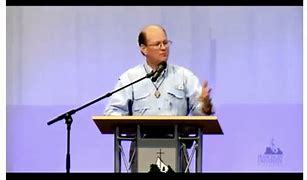 Steve Ray
Steve RayWe discuss what we believed as Protestants and contrast it with the Catholic view. He gives tons of scriptural support to prove the Catholic view and that the Protestant view is novel as far as history, and scripture, is concerned.
My apologies for Zoom freezing up during the interview.
Visit Steve’s awesome website www.catholicconvert.com for tons of free resources.
About Steve
Steve was raised in a devout and loving Baptist family. His father was a deacon and Bible teacher, and Stephen was very involved in the Baptist Church as a teacher of Biblical studies. After an in-depth study of the writings of the Church Fathers, both Steve and his wife Janet converted to the Catholic Church. He is the host of the popular, award-winning film series on salvation history, The Footprints of God. Steve is also the author of the best-selling books Crossing the Tiber, and St. John’s Gospel.
Steve also released a new book recently titled The Catholic Faith: An Introduction To The Creeds. It is released by TAN books and you can check it out here.
The Interview
You can listen to the podcast here.
The post Faith Alone? Is This How We Are Saved? appeared first on William Hemsworth.
November 6, 2020
God Is Mercy Conference: Join Me
Dear friends, I’m sharing a short talk at the online conference, ‘God is Mercy!’ I’m joining SmartCatholics to bring a variety of speakers together to grow in our understanding of God’s Mercy. The event lasts 2 days, from November 28-29.
God Is Mercy On Smartcatholics.com
And the best part is, it’s more than an online event. It’s a community that will grow. So come join me and dozens of other amazing Catholic speakers. You’ll be able to watch a selection of videos for free. It’s only $10 to join the community.
 smartcatholics.com
smartcatholics.comRegister for free today: smartcatholics.com.
The topic I’ll be speaking on is something I’m passionate about: Mercy In Confession.
So again, come join us for an amazing couple of days. Register for free today: smartcatholics.com
God bless!
The post God Is Mercy Conference: Join Me appeared first on William Hemsworth.
November 2, 2020
Mary Mother Of God…Updated
On my journey into the Catholic church there were three things that had the potential to derail me. Mary, Mary, and Mary. One of the objections I had, which sprang from my Baptist days, was the title of Mother of God for Mary.
After all God is eternal and has always existed. That title, at least in my mind back then, meant that somehow Mary was exalted to a deified state in which she surely didn’t belong. and one she would surely object to herself. How can a mere mortal be the Mother of God? This objection is one that is till quite prominent.
If you don’t believe me feel free to visit a Protestant/Catholic discussion forum on Facebook. Simply ask if Mary is the Mother of God and watch the sparks fly.
Mary The Theotokos
This issue was settled by the church in the 400’s at the Council of Ephesus. Nestorius, the Bishop of Constantinople, objected to the long revered title of Mary known as Theotokos. This is a Greek term that simply means “God-bearer”.
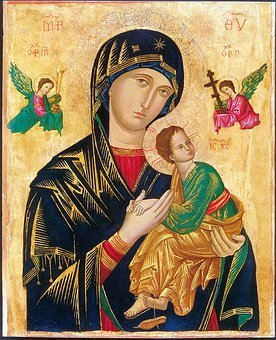
Nestorius decided to use a different term known as Christotokos, or “Christ-bearer”. This term is problematic for a couple reasons. First and foremost Nestorius used this term in an attempt to maintain the two natures of Christ, but he failed, because by using this term, he separated the human and divine nature of Christ from the person of Christ. His attempt to be Orthodox led him into heresy because Jesus had a human and divine nature while in the womb of Mary.
Mary And Proper Christology
To say that Mary only gave birth the to human Jesus would deny the teaching of scripture that states he is human and divine. Secondly, if Mary only gave birth to the human Jesus when did his divine nature arrive? Do you see the Christological dilemma?
Either Jesus had both natures since conception or he did not. To say he did not is to fall into error. Adoptionism is one result that can come from this line of thinking, the other is one that denies the hypostatic union. The latter is what would become known as Nestorianism.
The Church Settled It
The fact of Jesus having a human and divine nature coexisting in the one person of Jesus was upheld by the Council of Ephesus in 431. As a result the Greek term for our Blessed Mother, known as Theotokos, was upheld.
In short, calling Mary the Mother of God has everything to do with understanding Jesus properly, and even less to do with her. Regarding this para 495 of the Catechism states,
“Called in the Gospels ‘the mother of Jesus, Mary is acclaimed by Elizabeth, at the prompting of the Spirit and even before the birth of her son, as “the mother of my Lord”. In fact, the One whom she conceived as man by the Holy Spirit, who truly became her Son according to the flesh, was none other than the Father’s eternal Son, the second person of the Holy Trinity. Hence the Church confesses that Mary is truly “Mother of God” (Theotokos)”.
CCC para 495
As stated a few sentences ago, Jesus was fully God and fully man from the time of his conception. Mary gave birth to the second person of the Trinity, not a boy who would latter take on a divine nature.
The divine nature was already there. Since Mary gave birth to Jesus, who we affirm to be God incarnate, she gave birth to God. Yes my friends, it really is that simple. Nestorianism is the logical consequence for those who deny the Theotokos.
Youtube Videos
Works Cited
Catechism Of The Catholic Church http://www.vatican.va/archive/ccc_css/archive/catechism/p122a3p2.htm
The post Mary Mother Of God…Updated appeared first on William Hemsworth.
October 26, 2020
The Church And The Modern Era: A Review
I love church history. The study of the church and its history, especially the church fathers, is one huge reason why I am Catholic today. Over the course of this year Ave Maria Press has released a church history series. The series is called Reclaiming Catholic History. This particular book is the third of four in the series.
The Church And The Modern Era
This book covers the period of 1846-2005. The author, David Wagner, does a superb job in laying out the events of the world and how the church reacted to them.
This period of time covers many significant events in the history of the church. This book covers the loss of the papal states, the promulgation of the immaculate conception of the Blessed Virgin Mary, Vatican I and papal infallibility, the two words wars, and Vatican II. There is much more in between all these events.
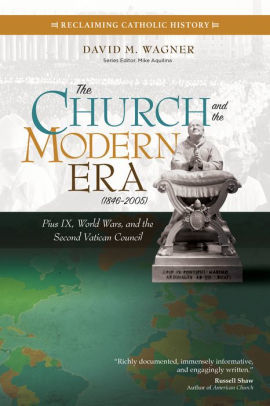
Anti-Catholic Myths Dealt With
There are many other events that the book covers, but the detailed history in the book is a big help. By looking at the series properly many anti-Catholic myths about the church’s history are aptly dealt with.
For instance a couple things that are dealt with is the assumption by some that the church is anti-science. The myth that papal infallibility was a “power grab”, and the dismantling of the “Hitler’s Pope” myth in regard to Pius XII.
A Must Read
The book is filled with great information. It is also written in a way that is easily understood. In other words it isn’t something that is written with a church historian in mind, but the average person in the pew.
Each chapter has a profile of a saint in the era being discussed. There is also a “you be the judge” segment that delves deeper into a specific controversy. It is a book I highly recommend.
About The Author
David M. Wagner is a lawyer and journalist who also works as a research fellow at the National Legal Foundation. He previously served as a law professor at Regent University, a speechwriter for the US Department of Justice, and as deputy counsel for the House Foreign Relations Subcommittee on International Operations and Human Rights.
Wagner earned his bachelor’s and master’s degrees from Yale University, where he specialized in theological and institutional Church history. He earned his law degree from George Mason University in 1992 and received American Jurisprudence awards in 1989 and 1991.
His work has appeared in many publications, including First Things, National Catholic Register, Crisis, National Review, The Weekly Standard, and& City Journal. Wagner covered the 1985 Extraordinary Synod on Vatican II for The Washington Times. He also contributed to the book Liberalism at the Crossroads.
[Note: This Book Was Provided free of charge from the publisher in exchange for an honest review.]
The post The Church And The Modern Era: A Review appeared first on William Hemsworth.
October 23, 2020
The Universe And Origins With Dr. Dan Kuebler
The Magis Center initiated a new video campaign called “The Purposeful Universe,” featuring Dr. Dan Kuebler, a Molecular and Cell Biologist and the Dean of Applied Science at Franciscan University of Steubenville. For the campaign, Dr. Kuebler explains the intricate interplay of order and chance propelling evolution and the purpose that this order implies. The campaign is the first in what the Magis Center. The series will be an ongoing series aimed at exploring the wonder of the cosmos. It will also explore the mystery of the human person.
The Universe Has Order
Dr. Kuebler states, “I’ve spent my entire career asking and answering questions about nature. All of the questions I have been able to answer, in fact all the successes of science are dependent upon one simple fact: we live in an ordered universe. I’m happy to be a part of this new project because I believe that an appreciation of the order in the universe is so sorely missing today—and I believe that people’s perceptions of the world would be enriched if they understood that the universe is filled with order from top to bottom. Such an understanding not only can transform the way we think about the universe, but also the way we think about our purpose in it.”
To access the video and other materials, please visit: purposefuluniverse.magiscenter.com
To learn more about the Magis Center, please visit: magiscenter.com
About Dr. Dan Kuebler
Daniel Kuebler received his Ph.D. in Molecular and Cell Biology from the University of California, Berkeley in December of 1999. Dr. Kuebler also earned a Masters of Science in Cell and Molecular Biology from the Catholic University of America in 1995. In addition, he has a Bachelors degree in English also from the Catholic University of America.
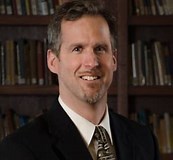 Dr. Dan Kuebler
Dr. Dan KueblerFor the past 20 years he has been a Professor of Biology at Franciscan University of Steubenville. AT the university he has been responsible for teaching courses in evolution, cell biology and human physiology. He is currently the Dean of the School of Natural and Applied Sciences at Franciscan University.
His biological research involves studying adult stem cells in bone marrow and adipose tissue for use in orthopedic treatments. As well as investigating of the physiological defects of seizure disorders. His work has been published in journals such as Brain Research, Genetics and the Journal of Translational Medicine.
He is the co-author of a book entitled The Evolution Controversy: A Survey of Competing Theories (Baker Academic). The book is a scientific critique of the various theories of evolutionary thought. Dr. Kuebler is currently working on a book examining the integration of Catholic teaching and evolution.
He has also presented and published academic papers regarding evolution and faith at a number of national and international meetings. In addition to his academic work, he has authored a variety of popular articles on science, evolution, politics and religion. These works have been published in places such as the National Catholic Register and the on-line journal Public Discourse.
The Interview
You can listen to the audio here.
The post The Universe And Origins With Dr. Dan Kuebler appeared first on William Hemsworth.
October 16, 2020
Three Bible Editions To Reinvigorate Your Study
I am a self-professed Bible nerd, and I collect various translations and editions of the Scriptures. This is something that started in my Protestant days and has carried on into the present as a Catholic. As a result, I often get asked what Bible will be suited best for a particular interest. Below are three great examples for people who are looking to not only expand their library, but grow in their faith.
1. The Augustine Bible
When I was a Protestant seminarian at Liberty University, I often used the English Standard Version. The translation flows well, is easy to read, and is regarded as one of the best literal translations available. The problem now is that is was a Protestant translation and doesn’t have all of our wonderful Old Testament canon. In 2018 the Bishops of India approved a Catholic edition of the ESV. The Augustine Institute released a version titled The Augustine Bible because it is published by them. This great translation is now available to American Catholics.
2. The Didache Bible
Contrary to what its name may suggest, this study bible is not based on the early church document known as The Didache. The scriptures themselves are the RSV-CE and are the translation of choice for many scholars. The notes themselves are commentaries based on the catechism. These noted list the appropriate paragraph in The Catechism, and in many cases, directly quotes from The Catechism. It is a great way to not only study scripture, but to intertwine the tradition of the church into your study in one easy volume. There are also a variety of articles within the Bible on various apologetics topics such as the Trinity, papacy, etc. If you want to understand what the Church teaches in a deeper and more meaningful way, then The Didache Bible is a one stop shop.
3. The Ignatius Study Bible
Another great volume for you to check out, if you haven’t already, is The Ignatius Study Bible. This Bible is another RSV-CE translation and the notes and commentary are superb. The notes and commentary are done by Scott Hahn and Curtis Mitch and are very enlightening. The notes cross reference other scriptures, the catechism, and saints. Included is a concordance so you can look up the passages where a certain word appears, as well as a doctrinal index that gives the biblical citation for catholic beliefs. The drawback of this Bible is that it is not in one volume. The New Testament is in one volume and is well worth the cost. Other volumes from the Old Testament are released as they become available.
If your goal is to understand scripture more deeper, or just to develop a better devotional life scripture reading is essential. The volumes listed fit various needs from the one who just wants scripture (The Augustine Bible), the individual who wants an outline of what the church teaches on scripture and its meaning (The Didache Bible), and the person who wants to dive deep into biblical theology (The Ignatius Study Bible). This is only a sampling, but the resources are out there. It is my prayer that this provides some guidance.
Check out the rest of this article as it appears on epicpew.com.
The post Three Bible Editions To Reinvigorate Your Study appeared first on William Hemsworth.
October 13, 2020
Baptism: Live It Out
The Book of Joshua is an interesting book of the Old Testament. It starts in the thick of things. Moses has died, and the children of Israel are about to enter the Promised Land. Before they do, they must cross the Jordan River, but they have no way to cross. It is at this point that they must look to the power of God over nature. In Exodus, the Lord parted the Red Sea so the Israelites could escape Pharaoh. In the Book of Joshua, God parted the Jordan River so His people could enter the Promised Land. Some in the early church saw a parallel of this journey with baptism.
Joshua 3:17 states, “The priests carrying the ark of the covenant of the Lord stood on dry ground in the Jordan riverbed while all Israel crossed on dry ground, until the whole nation had completed the crossing of the Jordan.”
The early Church figure, Origen of Alexandria (184-253 AD), wrote a brilliant Christian commentary on this passage relating it to the Sacrament of Baptism. Through Baptism, he said, we part the waters and are led by the New Moses, which is Jesus Christ (Origen, Homilies, 52). It is Christ through His priesthood who leads us into the future.
This is an important insight for those who are being baptized, says Origen.
God has shown over and over what He can do in the natural realm. He parted the Red Sea, He provided manna from Heaven, and today He begins a new work in you. Through Baptism, you step into the water, just as the twelve tribes did in the book of Joshua, and the waters part. You now follow the priests of Christ into the land of our inheritance. (53)
Plunging into the Depths of God’s Passion
Through Baptism we die and rise with Christ. This is a great responsibility and a great honor. Christ is exalted when we come to the baptismal waters. Baptism urges us to follow Christ and keep Him close. We dread falling back into sin and becoming like the Egyptians who were swallowed up by the Red Sea.
For those who were baptized at the Easter Vigil, there is a special significance to the ceremony, and the journey of faith is just beginning. It is a great time in the Church as we welcome new members. The catechumens answered the call to Baptism and were obedient to Christ, but what happens after that? It is a joyous moment, but sadly, it is also the last we see of some of our new members.
The simple fact is that some treat the Easter Vigil like a form of Catholic graduation after a long preparation process. Origen’s imagery concerning Baptism is insightful. Baptism is the journey across the Jordan River into the Promised Land of the Church. Those who receive Baptism are in a state of grace as all sin is washed away. Now is not the time for complacency. Now is not the time to return to Egypt!
Some may call me a buzzkill for pointing this out, but I have been there. When we become complacent, we are a prime target for Satan. He is looking for every opportunity to take us away from Christ. I am a convert to Catholicism, and that was me within three years of coming into the Church, so I want to provide some guidance to anyone who is wavering in their faith commitment.
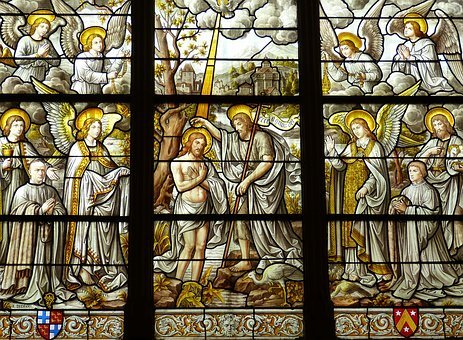 Jesus and Baptism
Jesus and BaptismNecessity of Prayer and Scripture Reading
First and foremost, it is imperative that you establish a prayer life. Prayer is our communication with God. Some struggle and think that we need elaborate words or requests, but that is not the case. There are many forms of prayer: reflecting on a passage of scripture, the Rosary, Lectio Divina, or sitting in a quiet space reflecting on God.
Whatever you choose is up to you, but try to have a dedicated space and time set aside every day for prayer. Make it part of your routine. There is really no better way to start the day than talking with our Creator.
Secondly, make it a habit to read scripture. The bible is the Word of God and is given to us for instruction. I read an acronym recently that called the bible “Basic Instructions Before Leaving Earth”.
Within its pages you will learn about some of the great men and women of faith who have preceded us. By reading scripture you will learn more about the life of Christ and how to live the Christian life. It is a discipline that will help you draw closer to the Lord.
Participate in the Church Community
Thirdly, find a way to get involved in your parish. You are sealed with the gift of the Holy Spirit at Confirmation, and you have a skill and gift that will benefit your parish. People are often hesitant to contribute because they think that what they are good at is insignificant. No way!
The Church is a family, and each member of the family has a part in its success. You can join a parish prayer group or bible study, or you can volunteer to clean the sanctuary. It all matters and is all important. When you get involved, you make friends with like-minded people who will support you and love you in difficult times.
This is by no means an exhaustive list, but the point is that it is just the beginning. Although we can receive Baptism and Confirmation only once, we must often reaffirm our faith commitments as reminders that our journey is never ending. In fact, it will only end at the conclusion of our earthly lives.
Remember the imagery of Origen: the Israelites crossing the Jordan is an allegory for Baptism. Once they entered the Promised Land, they didn’t remain for the rest of their lives on the far shore. They forged ahead, and that is what regularly receiving the sacraments and being involved in the life of the Church allows us to do.
WORK CITED
Origen, et al., Homilies on Joshua, Washington DC: Catholic University of America Press, 2002.
The post Baptism: Live It Out appeared first on William Hemsworth.
October 8, 2020
The New Testament Is Reliable
When it comes to a discussion about sacred scripture the word “accuracy” will definitely come up. Whether it is in regards to passages in the Old Testament or the New, but what is the basis for such questions? Is it an honest attempt to discern the truth or is one’s mind already made up?
This is a question that I myself had before I became a Christian, and it is the same that some of my best friends have now. How can an author or authors could possibly “quote” what Jesus, Peter, Stephen or any other person said when the author was not there and there does not appear to be any written documents that have the quotes?
Questions On New Testament Dating
This question is often asked because of the dates that the New Testament books were written in. Jesus lived between 4 B.C. and 33 A.D. and the first accounts of his life, the gospels, were not written until the 60’s. That is the Gospel we know today as the Gospel of Mark. David Black states
“The church historian Eusebius quotes the early Christian leader Papias as saying ‘This also the presbyter said: Mark, having become the interpreter of Peter, wrote down accurately, though not indeed in order, whatsoever he remembered of the things said or done by Christ (Black, page 140).”
To understand the significance of this statement we must look again to the life of Saint Peter. Saint Peter was a passionate man who was of great faith one moment and a doubter the next. He was a man that told Christ that he would never leave nor deny him, but we find him denying Christ just before the crucifixion.
New Testament Reveals Intimate Detail
In Mark 14:54 we read “Peter followed him at a distance into the high priest’s courtyard and was seated with the guards, warming himself with fire.” This is a detail that only Peter would know and he transmitted it to Mark who wrote it down.
The denials in the courtyard came next, and in Mark 15:72 at the end of the verse “He broke down and he wept.” These are intimate details of someone who lived through the experience of denying his Lord three times.
The Events Changed Lives
One may say that the personal details of Peter prove nothing about how Jesus could be accurately quoted so long after He resurrected. To this an experience of the individual could be brought up. We all have someone who is, or was, extremely close to us.
This person taught us something, was an influential figure in our lives. The fact that we never wrote their words down does not diminish them or void them when we recall them several years later. The same goes for the Apostles and evangelists of the New Testament.
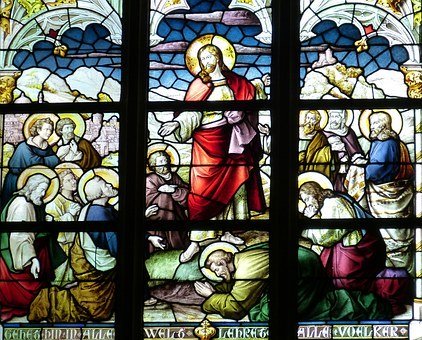
People Died For What They Saw
These individuals saw Christ walking, crying, healing, walking on water, and being compassionate to the unclean of the time. They saw him die, and though they did not personally see the resurrection they encountered the resurrected Christ later on. Imagine what kind of impact that would have on an individual?
Having seen, heard, and lived that how could one possibly ever forget the words of Christ? I would dare to say that it is impossible because they, with the exception of John, would die for those words themselves. One is not willing to die for something that is not true, or even partially true.
The Apostles took Christ’s command of making disciples very seriously. They would be in violation if they were writing or teaching anything that was not accurate.
More Documentation Than Any Other Record
In addition to the question above another comes up in regard to accuracy. How can we know that the New Testament is accurate when we do not have the original manuscripts? Josh McDowell answers this question by saying,
“There are now more than 5,686 know Greek manuscripts of the New Testament. Add over 10,000 Latin Vulgate and at least 9,300 early versions and we close to 25,000 manuscript copies of the New Testament in existence today. No other document of antiquity approaches this number. In comparison, Homer’s Iliad is second, with 643 copies that have survived (McDowell, page 60).”
All these copies they are basically the same with the exception of a word misspelled or misplaced here or there. These small errors do not change the message or doctrine of the text.
Raymond Brown writes,
“one fact is indisputable. Joined as the New Testament these twenty seven books have been the most important instrument in bringing untold millions of people from different times and places into contact with Jesus of Nazareth and the first believers who proclaimed him (Brown, page 15).”
The first generation of Christians contained more than the apostles. 1 Corinthians 15:6 states “After that, he appeared to more than five hundred at once, most of whom are still living, though some have fallen asleep.”
Not A New Issue
The question of the accuracy of the New Testament was around in the time of Saint Paul. In this passage he is basically telling the Corinthians to go ask those that witnessed the resurrection if you do not believe it.
Paul had absolute confidence in what he preached, and we have confidence that the New Testament is accurate today. The only reason that there were no earlier New Testament writings is because it was not commanded. Jesus did not write nor did He command his apostles to write.
He commanded them to preach and that they did. Brown states “He is never recorded as setting down even a word in his lifetime or telling any of his disciples to write. Accordingly the proclamation of the kingdom of God made present in Jesus did not depend on writing (Brown, page 5).”
The first Christians believed that the end times were at hand and did not feel the need to write. It was not until they started dying that they felt the need to write to preserve the teachings.
We Can Be Confident In The New Testament
What we have in the New Testament comes from those who knew Jesus on a personal level, or they were close companions of them. They all came from the first generation of Christians. They were people that lived in the same times as our Lord. To call anyone but Caesar Lord was suicide, yet they did it.
We can have faith that the New Testament is accurate because of the amount of ancient manuscripts we have, ancient historians that speak of it, and history has been unable to disprove it. Karl Keating has a wonderful quote about Christianity. He said “Christianity is the easiest religion to disprove, just show us the bones.”
Works Cited
Brown, Raymond, An Introduction to the New Testament. New York: Doubleday, 1997
Lea, Thomas D., and David A. Black. The New Testament: Its Background and Message. 2d ed. Nashville, TN: Broadman and Holman Publishers, 2003
McDowell, Josh. Evidence for Christianity. Nashville, TN: Thomas Nelson, 2006
The post The New Testament Is Reliable appeared first on William Hemsworth.
October 7, 2020
Another Gospel: An Interview Alisa Childers
Alisa Childers joins me to discuss how Progressive Christianity strays from the tenets of the faith and actually is another gospel. We discuss how relativism in Progressive Christianity has called into question the virgin birth, scripture, and the atonement.
About Alisa And Her Book Another Gospel
She has a new book on the topic titled Another Gospel. Alisa is a popular evangelical speaker and apologist that shows how Progressive Christianity has infiltrated the church. Alisa Childers is a wife, a mom, an author, a blogger, a speaker, and a worship leader. She was a member of the award-winning CCM recording group ZOEgirl. She is a popular speaker at apologetics and Christian worldview conferences, including reTHINK. Alisa has been published at The Gospel Coalition, Crosswalk, The Stream, For Every Mom,Decision magazine, and The Christian Post, and her blog post “Girl, Wash Your Face? What Rachel Hollis Gets Right . . . and Wrong,” received more than one million views. You can connect with Alisa online at alisachilders.com.
 Alisa Childers: Author Of Another Gospel
Alisa Childers: Author Of Another GospelThe Interview
Listen to the podcast here.
The post Another Gospel: An Interview Alisa Childers appeared first on William Hemsworth.
William Hemsworth's Blog
- William Hemsworth's profile
- 7 followers



